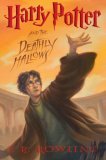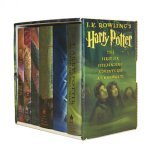
On the return flight from Europe, I was able to read the 7th and final Harry Potter book, Harry Potter and the Deathly Hallows (Book 7). This was yet another strong work from J.K. Rowling and a fitting end to an overall series. Before getting into my thoughts on the book (including spoilers below the crease!), I wanted to recap some of my thoughts on the movies compared to the books.
In the couple weeks preceeding HP7, I re-read the original 6 books. What I found most striking is that the first 3 movies stayed fairly true to the writing. However, the 4th book (Harry Potter and the Goblet of Fire (Book 4)), was significantly different in film. First and foremost, the movie makes Neville Longbottom out to be something other than awkward and bumbling, providing Harry with information on gillyweed and displaying phenomenal dance prowess. Just the opposite is true in the book.
Second, Dobby the house elf - freed through Harry's trickery in the 2nd book - is completely absent, whereas he, in fact, provided Harry with the gillyweed and helped ensure that he made it to the 2nd task of the Triwizard Tournament. Dobby's absence was continued in the 5th movie (book: Harry Potter and the Order of the Phoenix (Book 5)), which I also found disappointing. I now wonder if he'll surface in any of the movies again.
In terms of re-reading the first 6 books, I found it to be a very worthwhile exercise. It seems that much of my recollection of the stories was based on the movies (being a visual person, this is unsurprising), rather than on the text itself. Re-reading thus gave me insights into the conclusions of the 7th book.
*** WARNING: SPOILERS GOING FORWARD ***
After re-reading the first 6 books, I had concluded a few things:
1) Dumbledore was dead for good.
2) Snape was essentially good, though trapped into acting badly.
3) The horcrux hunt would be interesting, but get boring quickly.
4) In the end, good would triumph over evil.
5) Neville would play an important role.
6) Marriages: Lupin & Tonks, Bill & Fleur, Ron & Hermione, Harry & Ginny.
My friend Bob provided a more extensive prediction that actually turned out to be fairly good.
MSNBC has provided some excellent interview materials with the author, available at the following links. These stories include filling in details on questions that may have arisen from the last book.
* MSNBC: Finished ‘Potter’? Rowling tells what happens next
* MSNBC: Stop your sobbing! More Potter to come
* MSNBC: Confused by Potter? Author sets record straight
* MSNBC: Rowling: I wanted to kill parents
Things that I blatantly missed from previous readings:
- Aberforth, Dumbledore's brother, was the keeper at the Hog's Head Inn.
- Regulus Black was the R.A.B. in the locket.
- Malfoy officially defeated Dumbledoor in a duel, prior to Snape killing Dumbledore.
All of the rules surrounding duels, taking over the loser's wand, etc., were previously unmentioned. Thus, all the issues around the Elder Wand and who was the rightful owner was confusing.
Questions that I had at the end of the book:
- If the Epilogue was "19 years later" then why was Teddy Lupin on the train to Hogwarts? He should have already been graduated.
- Why was the Elder Wand actually the possession of Harry's?
- How was Neville able to get the Sword of Gryffindor?
The last two questions are answered by Rowling here. As for the first question, I have no idea what to think. Maybe if/when she writes her encyclopedia, it will all become clear.
The horcruxes, and how they were destroyed, are as follows:
- Tom Riddle's diary (basalisk fang, by Harry)
- Slytherin ring (Sword of Gryffindor, by Dumbledore)
- Slytherin locket (Sword of Gryffindor, by Ron)
- Hufflepuff goblet (basalisk fang, by Hermione)
- Ravenclaw diadem (Fiendfyre, by Crabbe)
- Nagini the snake (sword of Gryffindor, by Neville)
- Bonus: Harry Potter (Elder Wand w/ Killing Curse, by Voldemort)
This book was generally very dark. It's definitely not appropriate for younger children. Having read the book so intensely myself, I even had nightmares for a couple days. Writing this posting has helped get some of the recollections out of my brain.
It will be rather interesting to see how the 7th movie is constructed. I was very pleased to see Dobby returning as a hero in this book, but given his removal from other movies, I'll be very disappointed if he doesn't show up again. I also don't remember which book it was in that Harry received the special mirror from Sirius that allowed them to see each other and/or communicate. I thought it was HP5, but I don't recall it coming into play in the movie. This will be unfortunate given that it played an important role in HP7.
In the end, it was gratifying to find out that Snape had been acting in favor of Harry all along. His motives were still kind of sketchy, but at least he had been trying to work as a double agent. That Voldemort never caught on is very interesting, and a testament to how effective an Occlumens Snape really was.
All the deaths were very sad. I found the deaths of Hedwig and Dobby to be particularly disheartening in the book. The scene with Hagrid carrying Harry's believed-to-be-dead body from the forest at the end stands to be heart-wrenching in the movie. Neville's getting the Sword of Gryffindor to do in Nagini was most excellent. I actually would have enjoyed seeing more of the underground movement he led at Hogwarts in year seven.
Overall, I'm very sad to see the series end, but believe the ending is mostly fitting. There are some interesting parallels with Nazi Germany and Christianity. On the first count, the treatment of Muggles, including mandatory registration of "Mudblods" with the Ministry of Magic sound very much like the rounding up of the Jews. Once again, an excellent example (if fictitious) of creating a common enemy to unite against. As for the similarities to Christianity, it was very intriguing that love played a prominent role and that the solution to the Voldemort problem was Harry ("the Chosen One") having to sacrifice himself without regard for his own well-being. Sounds very familiar.
All that being said, I don't know that this would qualify necessarily as a morality play. It's definitely trying to get across points, but it seems that Rowling was really more interested in giving kids hope in the face of adversity than anything else. While she was promoting values of love, courage, and perseverence, I'm not convinced that she was necessarily authoring the books from the perspective of pushing those values.
Some day, when the price drops, I would like to listen to all of the audiobook recordings for all seven books. I've heard they're very good.


